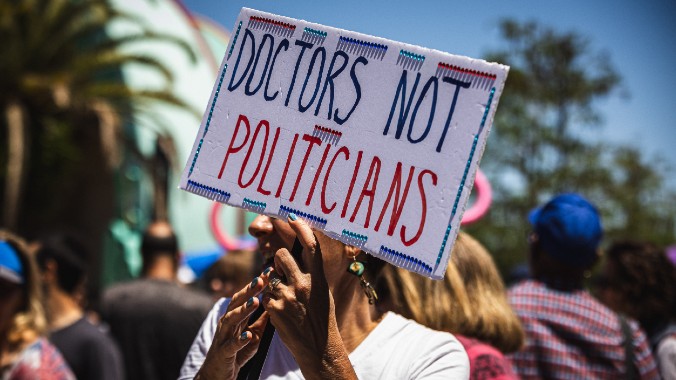Florida’s 6-Week Abortion Ban Takes Effect: ‘Not Survivable’
In November, the state will vote on whether to enshrine a right to abortion—but that’s six months away. For the foreseeable future, Floridians—along with the rest of the South—will live under a devastating abortion ban.
Photo: Shutterstock AbortionPolitics
On Wednesday, Florida’s six-week abortion ban, which Gov. Ron DeSantis signed last spring, officially went into effect. For months, the bill was temporarily blocked, pending a lawsuit at the state Supreme Court that challenged the state’s 15-week ban. But in April, the court ruled the ban could take effect, while simultaneously allowing a ballot measure to possibly enshrine a right to abortion in the state Constitution to move forward in November.
While reproductive rights advocates celebrated the approval of the ballot measure, it doesn’t change reality: The state now lives under a near-total abortion ban. For about two years, Florida was the last state in the South where abortion was at least somewhat available (through 15 weeks). Now, abortion seekers in the region have been plunged into even deeper chaos. Calla Hales, executive director of A Preferred Women’s Health Center, oversees two clinics in North Carolina (where abortion is banned at about 12 weeks), as well as two clinics in Georgia. North Carolina is now the closest state where, if someone isn’t past 12 weeks pregnant, they might be able to access abortion care. Hales called Florida’s six-week ban “not just not sustainable, but not really survivable.”
In 2023, Florida provided 80,000 abortions, which included an estimated 7,000 people who traveled from another state. According to the state’s health care administration, more than 1,300 of the 15,000 abortions performed in Florida so far this year were for out-of-state patients. And, as HuffPost’s Lydia O’Connor points out, Florida’s geographical isolation “means many patients there will have to cross multiple state lines to get an abortion.”
-

-

-

-

-

-

-

-

-

-

-

-

-

-

-

-

-

-

-

-

-

-

-

-

-

-

-

-

-

-

-

-

-

-

-

-

-

-

-

-








































